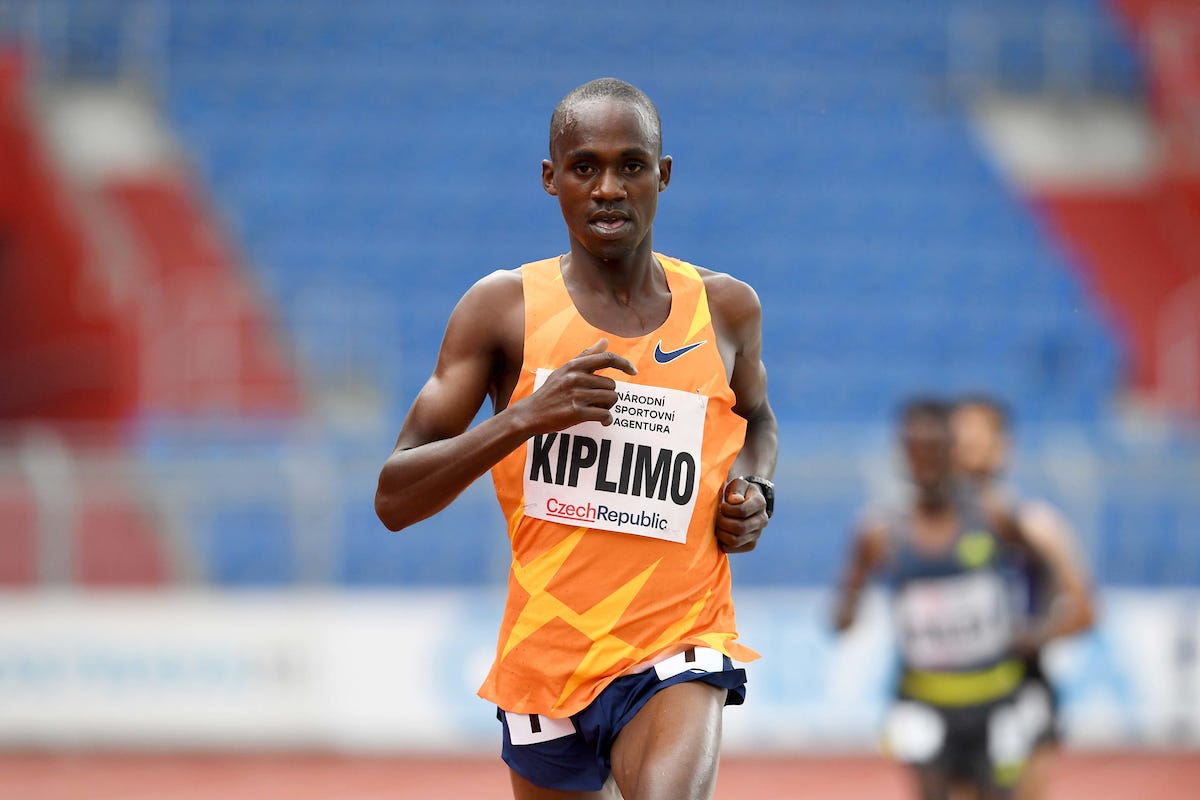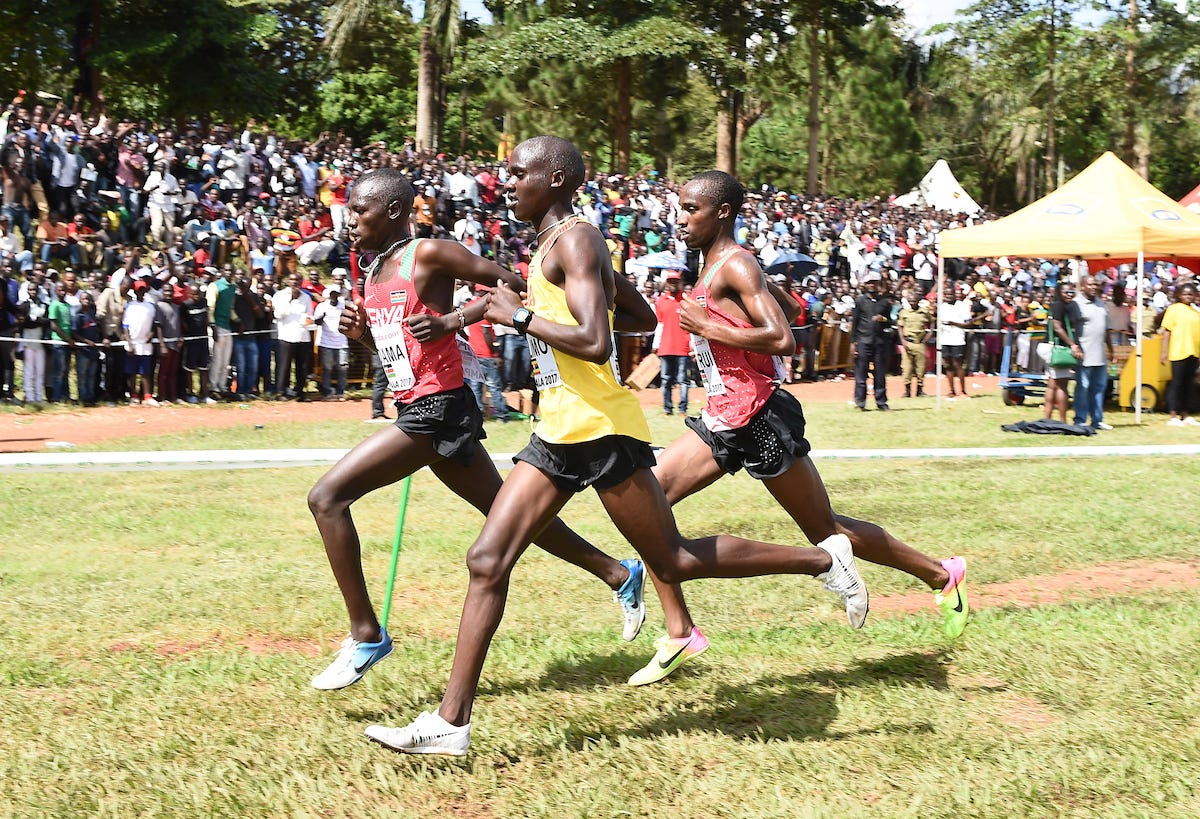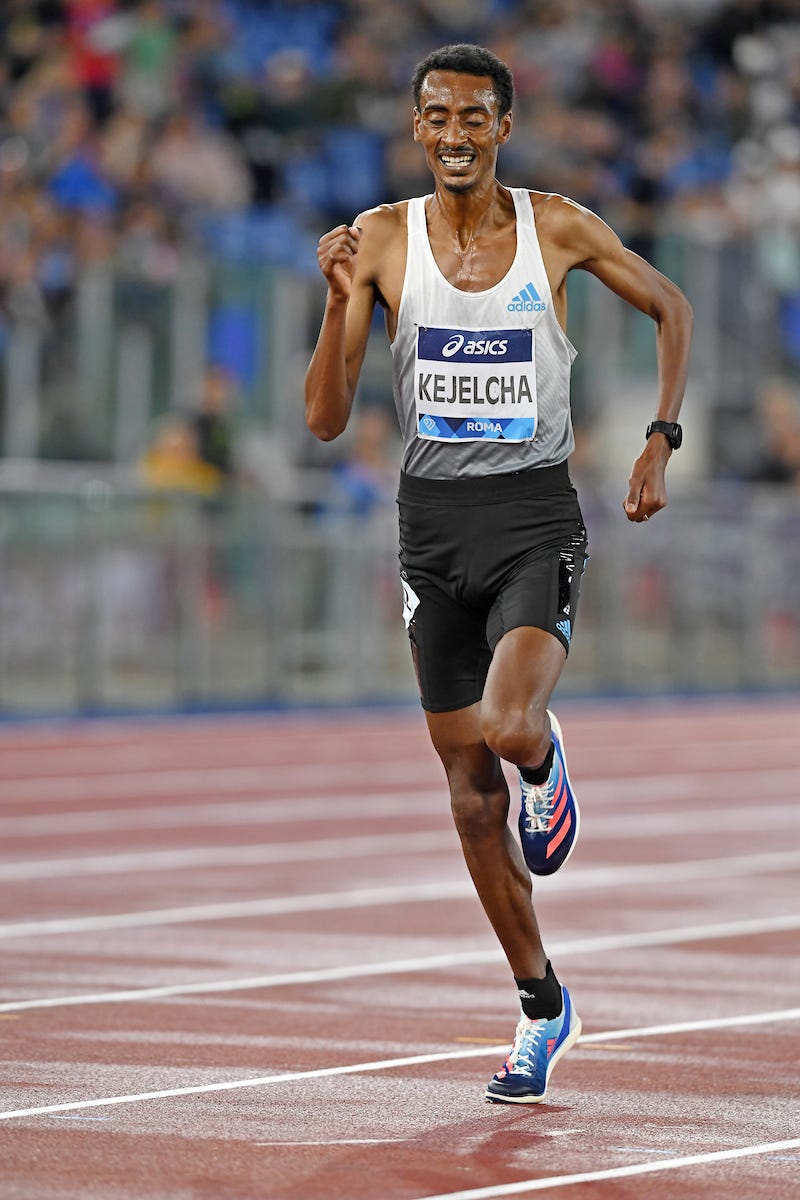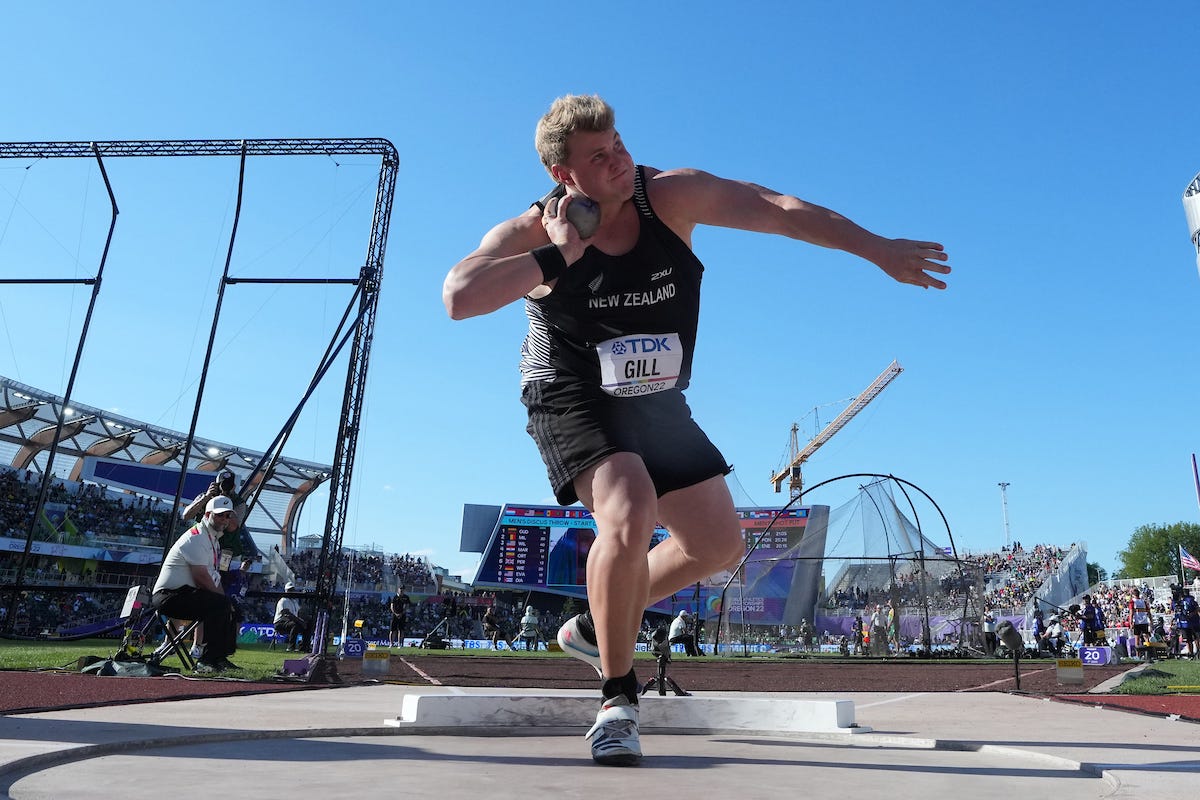Week in Review: A star is on the rise
Kiplimo's runaway victory in New York City Half Marathon signals a shift may be underway in Ugandan distance running

As someone who has been following the sport of track and field since the 1972 Olympic Games, I have always found it interesting to see how quickly the fortunes — or at least the perceived fortunes — of athletes can turn.
Take the case of Joshua Cheptegei.
The 26-year-old Ugandan had arguably been the best male distance runner in the world over the previous four years heading into the World Athletics Cross Country Championships near Bathurst, Australia last month. But after finishing third in that race on Feb. 18 and second in the New York City Half Marathon on Sunday, an argument can be made that Cheptegei is no longer the top runner from his east African nation of 47 million people.
That distinction currently falls to Jacob Kiplimo, the winner of the men’s title in the World Cross Country Championships, as well as in the New York City Half Marathon.
Cheptegei could conceivably come back to win his third consecutive title in the 10,000 meters when the World Athletics Championships are held in Budapest, Hungary in August, but the world-record-holder in the 5,000 and 10,000 has not been at Kiplimo’s level for the past month.
That was evident in the World Cross Country Championships, when he finished 20 seconds behind Kiplimo, and it was even more clear in the New York City Half Marathon, when he was 38 seconds behind his countryman who has toiled in his shadow for many years.
“I’m very excited to win the race, my first half marathon of 2023,” Kiplimo said in a World Athletics post. “Even though it was cold, I did my best. For the past two months, I have been preparing for cross county, and that helped me a lot in this race.”
While plenty of people will correctly point out that the half marathon is the distance in which Kiplimo has had his greatest success — whereas Chetegei has excelled most in the 10,000 — we could very well be witnessing the start of the coming of age of an immensely talented runner who finished 11th in the 5,000 in the 2016 Olympic Games in Rio de Janeiro when he was 15.
Although he posted eye-opening bests of 13 minutes 19.54 seconds in the 5,000 and 27:26.68 in the 10,000 that year and won the men’s U20 (under 20) title in the 2017 World Cross Country Championships in the Ugandan capital of Kampala, Kiplimo’s big breakthrough came in 2020.
The international track and field season was very short and compacted that year due to the COVID-19 pandemic, but Kiplimo nonetheless ran personal bests of 12:48.63 in the 5,000 on Sept. 8 and 7:26.64 in the 3,000 on Sept. 17 before running 58 minutes 49 seconds to win the men’s title in the World Athletics Half Marathon Championships in Gdynia, Poland on Oct. 17.
He was an unexpected winner of that race as fourth-place Cheptegei — who ran 59:21 — had lowered the world record in the 10,000 to 26:11.00 10 days earlier after setting the 5,000 mark of 12:35.36 in August.
“I feel great, it was my first time at the World Half Marathon Championships and I won!” Kiplimo said in a World Athletics post. “It is hard to explain, because I am full of emotion. Unbelievable. The weather was really good, as were the conditions and course. I'm so grateful for everyone who has supported me.”
Since that day, Kiplimo has run three of the five fastest half marathons in history, including a world record of 57:31 in 2021, lowered his personal best in the 10,000 to 26:33.93, and won bronze medals in the 10,000 in the Olympic Games in Tokyo in 2021 and in the World Championships in Eugene, Oregon last July. Yet he was overshadowed by Cheptegei, who had finished in front of Kiplimo when he won the 10,000 in Eugene, as well as when he placed first in the 5,000 and finished second in the 10,000 in Tokyo.
Although Kiplimo turned in a notable double victory in the 5,000 and 10,000 in the Commonwealth Games in Birmingham, England last August, it made sense that he was an underdog to Cheptegei entering the World Cross Country Championships, for his older teammate had defeated him to win the men’s title in the 2019 meet in Aarhus, Denmark.
However, it was Kiplimo who had the luxury of waving to the crowd during the final 200 meters of the 10K race in Australia after he had broken away from Cheptegei and eventual second-place finisher Berihu Aregawi of Ethiopia three minutes earlier.
“First place is very nice. . . I really wanted to win this time,” Kiplimo said in a World Athletics post. “I think my tactics were the best. I want to win another gold medal for my country. That’s my mission.”
The half marathon in New York City had been billed as a rematch between Kiplimo and Cheptegei, but it wasn’t much of a race once Kiplimo stepped on the accelerator about 17 kilometers into the 21.1-kilometer contest.
Chetegei and Zouhair Talbi of Morocco had been running with Kiplimo up to that point, but Kiplimo had a 12-meter lead over second-place Cheptegei and a 15-meter advantage over Talbi a minute after making his initial break. His advantage had grown significantly when he came through 20 kilometers in 58:28, as Cheptegei clocked 58:56 at that point in the race, followed by Talbi at 59:05.
After running 30:12 over the hilly opening 10 kilometers of the course, Kiplimo ran 14:24 for the third 5-kilometer segment of the event before really applying the pressure with a superb 13:52 split for the fourth segment.
His final time of 1:01:31 left him well ahead of second-place Cheptegei (1:02:09) and third-place Talbi (1:02:18).
It also led me to wonder if his days of being the No. 2 runner in his country are over for good.

Obiri in control: While many viewed the men’s race of the New York City Half Marathon on Sunday as a showdown between Ugandans Jacob Kiplimo and Joshua Cheptegei, Hellen Obiri of Kenya was the definitive favorite in the women’s race and she showed why as her 1:07:21 clocking gave her a comfortable margin of victory over defending champion Senbere Teferi of Ethiopia, who ran 1:07:55.
The 33-year-old Obiri, who is transitioning to the longer distances on the roads after a stellar track career in the 5,000 and 10,000, pushed the pace from very early in the race. She had a one-second lead on Teferi when she came through the 5- and 10-kilometer marks in 15:50 and 31:29 (15:39), respectively.
Teferi continued to run just behind Obiri for the next 15 minutes of the contest before the silver medalist in the 10,000 in last year’s World Championships made a definitive move just before the 9-mile mark.
She had a seven-second lead over Teferi when she came through 15 kilometers in 47:29 and her advantage had probably quadrupled by the time she came through 20 kilometers, although there were no official splits for her at that juncture of the race.
Karoline Bjerkeli Grovdal of Norway, who won her second consecutive European cross country title in December, finished third in 1:09:53.
While Obiri’s time was nearly three minutes shy of the 1:04:22 personal best she ran over a flat course in Ras Al Khaimah, United Arab Emirates, last year, she was pleased with her effort.
“I’m so grateful to have won this race,” she said in a World Athletics post. “There was a lot of wind, but I tried to push the pace after 15 kilometers. My mind was just on winning and not the time because it was a hard course. I still wanted to run sub-70, so I’m happy to have done that and to have won today.”
Oh so close: Yomif Kejelcha of Ethiopia missed the world record for the men’s 5,000 meters by one second when he ran 12:50 in a race in Lille, France on Sunday.
The two-time world indoor champion in the 3,000, Kejelcha came through the first kilometer in 2:32, along with countrymen Telahun Haile Bekele and Yasin Haji, and World 5,000 silver medalist Jacob Krop of Kenya.
However, he was seven seconds clear of Bekele, Tesfaye Kidanu of Ethiopia and World U20 (under 20) 1,500-meter champion Reynold Kipkorir of Kenya when he came through three kilometers in 7:40.
He further widened his lead over the last two kilometers as his winning time improved on his previous best of 12:53, and left him well clear of Kipkorir (13:04) in second place and Bekele (13:07) in third.
His performance also moved him to second on the all-time performer list, one second ahead of Ugandan Joshua Cheptegei, who ran 12:51 in 2020.
Although the world record did not receive a scare in the women’s race, it was an exciting affair as Carolina Nyaga of Kenya edged Mekides Abebe of Ethiopia in a contest in which each of them were credited with times of 14:35 to move into a tie for ninth on the all-time performer list. Doris Cherop of Kenya finished third in 14:40.
A seven-runner lead pack came through the first kilometer in 2:53, but Nyaga was just ahead of Abebe and Cherop when she came through three kilometers in 8:47.
Those three ran together until late in the race when Nyaga and Abebe broke away from Cherop and Nyaga crossed the finish line just in front of Abebe, the bronze medalist in the 3,000-meter steeplechase in the World Championships.

Two for two: Amedework Walelegn of Ethiopia won his second marathon in four months in the Korean capital of Seoul when he won the men’s division of the Seoul International Marathon on Sunday.
His time of 2:05:27 topped his previous best of 2:06:59 that he had set in winning the JBTC Seoul Marathon in November.
The 24-year-old Walelegn was part of the lead pack that came through five kilometers in 14:51, 10 kilometers in 29:33 (14:42), and the halfway point in 1:02:30.
He was one of eight runners who came through 30 kilometers in 1:29:31 before he covered the next five kilometers in 14:34 to take a seven-second lead when he passed through 35 kilometers in 1:44:05.
He gradually expanded his lead over the remainder of the race as countrymen Shifera Tamru Aredo (2:05:41) and Haftu Teklu Asefa (2:05:53) finished second and third, respectively.
The women’s race did not receive platinum label recognition from World Athletics and therefore only consisted of Korean runners. It was won by Jeong Daeun in 2:28:32.
Better late than never: I missed reporting it in the previous Week in Review, but Berihu Aregawi of Ethiopia ran 26:33 for 10,000 meters in a race in Laredo, Spain on March 11.
It was the second-fastest road 10K in history, trailing only the 26:24 clocking that Rhonex Kipruto of Kenya had run in Valencia, Spain in 2020.
The 22-year-old Aregawi, who was looking to add the world record in the road 10,000 to his world record of 12:49 in the road 5,000, outran the designated pacesetters from early on in the race. He came through the first kilometer in 2:36, through three kilometers in 7:51, and past five kilometers in 13:10.
His pace slowed some during the next four kilometers before he ran his final kilometer in 2:36 to finish in 26:33.
Start of a real rivalry?: Ryan Crouser and — to a lesser extent — Joe Kovacs have been so dominant in the men’s shot put since 2019 that it’s easy to feel ho-hum about a 22-meter (72 feet 2¼ inches) effort in the event. But Jacko Gill of New Zealand became the 32ndmember of the 22-meter club when he upped his personal best to 22.12 (72-7) in a meet in Auckland, New Zealand last Thursday.
The 28-year-old Gill, who was ranked sixth in the world by Track & Field News for 2022, hit his personal best in the first round and also had puts of 21.92 (71-11) and 21.78 (71-5½) on his second and third attempts.
His victory marked the second time in 12 days that he had defeated countryman Tom Walsh, the 2017 World Champion who has been ranked among the top three putters in the world every year since 2015, expect for 2020 when Track & Field News did not have world rankings because so much of the season was cancelled due to the COVID-19 pandemic.
The sky had appeared to be the limit for Gill after he won the men’s shot put — at the age of 15 — in the 2010 World Athletics U20 (under 20) Championships and successfully defended that title two years later. But Walsh had won 13 consecutive New Zealand senior titles until Gill defeated him with a 21.80 (71-6¼) put in the national championships in Wellington on March 4.
Then came last Thursday, when his 22.12 effort in the Sir Graeme Douglas International meet topped his previous best of 21.90 (71-10¼) that he had set in finishing second to Walsh in the Commonwealth Games in Birmingham, England last August.
“I felt good, and I was really happy to get the PB,” Gill said in a post on staff.co.nz. “It was a good week, I had good preparation, and I was really happy it all came together today… In the warmups I felt like I had a good rhythm. I thought it was far, but not quite that far, so I was stoked."

Two-liners: Taoufik Allam of Morocco ran a personal best of 2:07:43 to win the men’s division of the Rome Marathon on Sunday. Allam’s time gave him a comfortable margin of victory over second-place Wilfred Kigen of Kenya and crushed his previous best of 2:11:30 he had run in winning the Dublin Marathon last year. . . . Betty Chepkwony of Kenya came from behind to win the women’s division of the Rome Marathon in a personal best of 2:23:02 on Sunday. Chepkwony was 27 seconds behind the leaders after 10 kilometers and she trailed the lead group by 17 seconds at the halfway point of the race, but she gradually reeled them in and defeated second-place Fozya Amid of Ethiopia (2:25:08) by more than two minutes while crushing her previous best of 2:30:28. . . . Zhenye Xie of China won the men’s 100 meters in a yearly world-leading time of 10.05 seconds in the Hurricane Invitational at the University of Miami on Saturday. Xie ran a personal best of 9.97 in the 100 in 2018 and he set the Asian record of 19.88 in the 200 in 2019. . . . Alia Armstrong of LSU won the women’s 100-meter hurdles in 13.06 in the Hurricane Invitational at the University of Miami on Saturday. It was the first outdoor race of the season for the defending NCAA champion who ran a personal best of 12.43 in a semifinal of last year’s World Athletics Championships in Eugene, Oregon before placing fourth in the final. . . . Tobi Amusan of Nigeria won the women’s 200 meters in 23.38 in the Tiger Track Classic at Auburn University on Saturday. It was the first race of the season for Amusan, who set a world record of 12.12 in the 100 hurdles in the semifinals of the World Championships last year before winning the final in a wind-aided 12.06. . . . Masai Russell of the University of Kentucky won the women’s 400-meter hurdles in 56.66 in the Black and Gold Invitational at the University of Central Florida on Saturday. It was the first outdoor race of the season for Russell, who equaled her personal best of 7.75 in the 60 hurdles in finishing second to Ackera Nugent of Arkansas (7.73) in the NCAA Indoor Championships on March 11.
Pocket Rocket to open season in Gaborone: Shelly-Ann Fraser-Pryce of Jamaica announced last week that she will open her season in the Botswana Golden Grand Prix meet in Gaborone, Botswana on April 29.
The 36-year-old Fraser-Pryce, who is affectionately known as the Pocket Rocket, is coming off a season in which she won an unprecedented fifth title in the women’s 100 meters in the World Championships in Eugene, Oregon and in which she ran under 10.70 seconds in the 100 an unprecedented seven times.
She also finished second in the 200 in the World Championships last year, but said recently that she is unsure if she will attempt to make the Jamaican team in that event for the World Championships that will be held in Budapest, Hungary in August.
Kipyegon to open season in Doha: Faith Kipyegon of Kenya, the two-time Olympic and World champion in the women’s 1,500 meters, announced last week that she will open her season in a Diamond League meet in Doha, Qatar on May 5.
The 29-year-old Kipyegon, who missed the world record in the 1,500 by three tenths of second when she ran 3:50.37 in Monaco last August, will run the 1,500 in Doha.
She opened her season in Doha last year when she ran 8:38.05 in the 3,000 to finish second to Francine Niyonsaba of Burundi, who ran 8:37.70.
On the athlete suspension front: Rauven Saunders, the silver medalist in the women’s shot put in the Olympic Games in Tokyo in 2021, has accepted an 18-month suspension for committing three whereabouts failures within a 12-month time period.
The United States Anti-Doping Agency announced in a March 15 press release that Saunders had accrued the three whereabouts failures on January 8, May 26, and August 15 of last year.
Saunders’ 18-month suspension began on August 15, 2022, the date of her last whereabouts failure, and will prevent her from competing again until February 15, 2024.
The 26-year-old Saunders, who has a personal best of 19.96 (65-6) in the shot put, is the third high-profile U.S. track and field athlete in the last nine months to have been suspended for three whereabouts failures.
The others are decathlete Garrett Scantling and 400-meter sprinter Randolph Ross.
The 29-year-old Scantling, who placed fourth in the Olympic Games in 2021 and totaled a yearly world-leading score of 8,867 points in the decathlon last year, is serving a three-year suspension and will not be eligible to compete until June 27, 2025.
The 22-year-old Ross, who won three NCAA titles (indoors and outdoors) in the 400 for North Carolina A&T and has a best of 43.85 in the event, is also serving a three-year suspension, with his running through June 25, 2025.
Scantling and Ross are serving longer bans than Saunders because they were found to have committed a “tampering violation” when it came to the investigation of their whereabouts failures.



